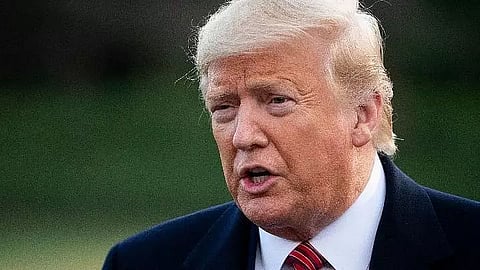
- Home
- Live Blog
- Breaking News
- Top Headlines
- Cities
- NE News
- Sentinel Media
- Sports
- Education
- Jobs

NEW YORK: Former US President Donald Trump has been acquitted for a second time by the Senate after Republicans overwhelmingly voted against convicting him on the charge of inciting the January 6 riot at the Capitol, but senior party leader Mitch McConnel blasted him soon afterwards for provoking it.
The Senate voted 57 to 43 to convict him on Saturday and although seven Republicans went over to the Democrat's side to convict him, it was 10 votes short of the 67 needed for the two-thirds majority needed for conviction.
The other Republicans stood firmly by Trump thwarting his conviction, although after the vote McConnell delivered his harsh criticism pinning on him the blame for the riot that killed at least five people including a police officer. Two other police officers died in its aftermath.
In his first trial in February 2020 on the charges of abuse of power and obstruction of Congress he went free because the Democrats could not muster 67 votes.
If Trump can claim a victory, it was tarnished by his own party members blaming him for the riot, even as they voted against his conviction.
Most Republicans and Trump's lawyers argued that since the Constitution specified the president as one of those who can be impeached with the punishment of being removed from office, he could not be tried as he was now a private citizen.
Democrats and their Republican supporters, however, said that although he was no longer the President, he could still be impeached and face the penalty of being barred from running for office.
The Democratic Party leader in the Senate, Chuck Schumer condemned the Republicans who voted against the conviction.
Trump has disputed the results of the November 3, 2020, election that he lost alleging that there was massive fraud. On the day of the riots, he held a rally of his supporters at which he repeated the fraud claim saying that the election was "stolen" and told them "we fight like hell and if you don't fight like hell, you're not going to have a country anymore".
Some of his supporters later marched to the Capitol while Congress was tallying the votes of the electoral college that elected Biden.
A section of them broke through the security and stormed the building, breaking into the Senate chamber and the offices of leaders like Speaker Nancy Pelosi.
Mike Pence, who as the then-Vice President was presiding over the Senate, and other members of Congress were hustled away to safety.
After two days of Democratic Party arguments during the trial with videos of the riots interspersed with clips of Trump speaking to his supporters, Trump's lawyers gave a short presentation on Friday defending him.
But on Saturday morning when the Senate was expected to have short concluding arguments by both sides and vote on the conviction, Jamie Raskin, the lead prosecutor, sowed confusion by demanding to call as a witness Republican Representative Jaime Herrera Beutler who had claimed that Republican party leader in the House, Kevin McCarthy, had told her that when he spoke to Trump about the rioters breaking into the Capitol he appeared to condone it. The Senate voted to call witnesses, but Trump's lawyers scored a minor victory when they force the prosecutors to back off from calling witnesses.
Trump's lawyer Michael van der Veen threatened to call 100 witnesses, including Vice President Kamala Harris and Speaker Pelosi, with likelihood of the trial stretching indefinitely and if the Democrats blocked his request it would give the impression that the trial was unfair.
Under pressure from Democratic leaders who did not want to prolong the trial, the prosecutors dropped their demand for witnesses and instead agreed to only have Beutler's statement included in the record of the proceedings.
Beutler had said on Friday night when the trial seemed ready to wrap up: "When McCarthy finally reached the president on January 6 and asked him to publicly and forcefully call off the riot, the President initially repeated the falsehood that it was Antifa that had breached the Capitol."
Trump's lawyers mostly centered their defence on his constitutional rights to free speech in questioning the election and asserted that while he wanted his supporters to protest, he did not want them to riot.
They cited another part of his speech in which he said: "I know that everyone here will soon be marching over to the Capitol building to peacefully and patriotically make your voices heard." They also said that Democratic leaders had also told their supporters to "fight like hell" and it wasn't to be taken seriously.
Democrats knew from the beginning that their impeachment would likely end in Trump's acquittal, but they went ahead to avenge their humiliations by Trump and to derail the Republicans in next year's mid-term elections.
Even Republicans like McConnell, who had criticised Trump for continuing to question the election and blamed him for the riots, could not vote to convict him because the former President still has the loyalty of his supporters who are a core element of the party. Republican leaders are now caught between keeping the support of Trump's base, while not alienating the moderates disgusted by the attack on Congress.
Having voted against conviction to placate Trump's supporters, they feel free to criticise him to appeal to the moderates. But Trump threatens to continue to haunt them. He said after the acquittal: "Our historic, patriotic and beautiful movement to Make America Great Again has only just begun. In the months ahead I have much to share with you, and I look forward to continuing our incredible journey together to achieve American greatness for all of our people." (IANS)